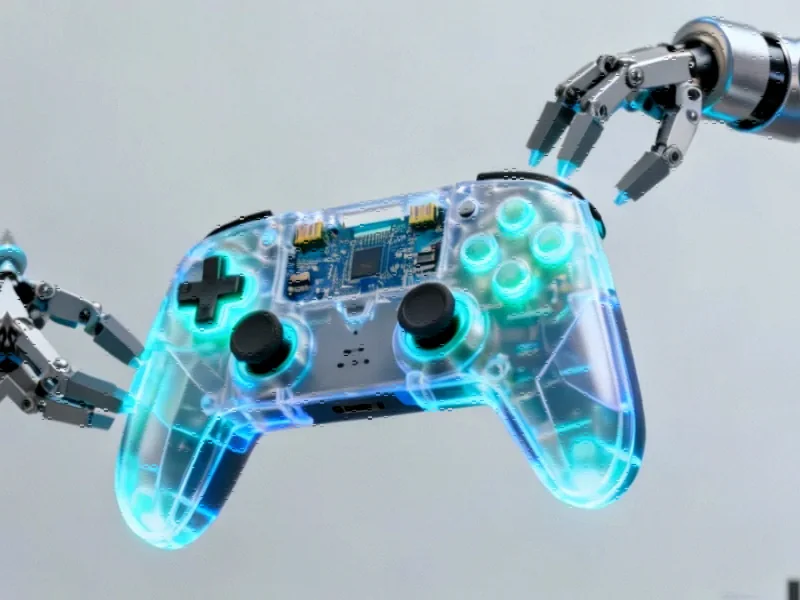According to The Verge, Panic’s Playdate handheld has emerged as an unexpected hub for innovative puzzle games, offering unique experiences that stand apart from mainstream mobile gaming. The device features several standout puzzle titles including Lexgrid, which combines word search mechanics with crossword-style clues and introduces symbolic modifiers that players must decipher without instructions. Togglebot offers spatial puzzles reminiscent of Nintendo’s Boxboy series with color-switching mechanics, while What Time Is It? presents 50 image-based puzzles where players determine times from visual clues using the Playdate’s signature crank. These games exemplify how the handheld serves as an antidote to phone-based gaming, encouraging focused puzzle-solving sessions rather than endless scrolling. This development signals an interesting shift in how specialized hardware can foster unique gaming experiences.
Table of Contents
The Hardware Renaissance in a Software-Dominated World
What makes the Playdate particularly fascinating is how it bucks the trend toward platform-agnostic gaming. While most developers focus on creating experiences that work across smartphones, consoles, and PCs, the Playdate embraces its physical limitations as creative opportunities. The crank isn’t just a gimmick—it fundamentally changes interaction paradigms, as seen in What Time Is It? where turning the crank to set a watch creates tactile engagement that touchscreens can’t replicate. This approach recalls Nintendo’s philosophy with the DS and Wii, where unique hardware capabilities spawned entirely new genres. The Playdate’s success with puzzle games specifically makes sense—puzzles thrive on novel interaction methods that make problem-solving feel fresh and physical.
Building a Sustainable Indie Ecosystem
The Playdate’s growing game library, particularly its puzzle offerings available through platforms like Itch.io, represents a fascinating experiment in sustainable indie game development. Unlike the crowded mobile app stores where discovery is nearly impossible for small developers, the Playdate’s curated approach creates a viable marketplace for experimental titles. This model allows developers to create games specifically for an audience that values creativity over mass appeal. The success of puzzle games on the platform suggests there’s substantial demand for thoughtful, well-designed experiences that don’t rely on addictive mechanics or microtransactions. This could inspire other hardware manufacturers to create specialized platforms for niche genres.
The Evolution of Puzzle Game Design
These Playdate titles represent the latest evolution in puzzle video game design, moving beyond traditional mechanics into more experimental territory. Lexgrid’s approach of withholding instructions forces players into a discovery process that’s increasingly rare in modern gaming, where tutorials often hand-hold players through every mechanic. This “figure it out yourself” philosophy creates a deeper sense of accomplishment but also presents accessibility challenges. Meanwhile, Togglebot demonstrates how minimal mechanics can create complex spatial reasoning challenges, proving that constraint often breeds creativity. These design approaches contrast sharply with mainstream puzzle games that typically prioritize immediate accessibility over depth.
Broader Market Implications and Challenges
The Playdate’s success with puzzle games highlights an underserved market segment: gamers seeking thoughtful, short-session experiences that don’t demand hours of continuous play. This challenges the prevailing wisdom in mobile gaming, where retention metrics often drive design decisions toward addictive rather than satisfying experiences. However, the platform faces significant challenges in scaling this model. The hardware’s niche appeal limits the potential audience, which could make it difficult for developers to achieve financial sustainability long-term. Additionally, as noted in the Lexgrid example, the lack of guidance in some games could frustrate players accustomed to more hand-holding approaches, potentially limiting broader appeal.
The Future of Specialized Gaming Platforms
Looking forward, the Playdate’s puzzle game success suggests we might see more specialized handheld game consoles targeting specific genres or play styles. We’re already seeing similar trends with devices like the Analogue Pocket for retro gaming enthusiasts and various VR headsets for immersive experiences. The key differentiator for Playdate is its focus on creativity and novelty rather than technical specifications. As games like Lexgrid, Togglebot, and What Time Is It? demonstrate, sometimes the most innovative gaming experiences come from embracing limitations rather than pushing technical boundaries. This approach could inspire a new wave of hardware that prioritizes unique experiences over raw power.



